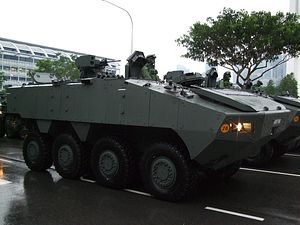China has officially lodged a diplomatic complaint with the government of Singapore after a shipment of nine Singaporean military vehicles was seized by Hong Kong customs officials in mid-November, en route from Taiwan to Singapore after the two countries conducted joint military training exercises.
The shipment of military vehicles was initially seized by Hong Kong customs officials on suspicion of illegal arms trading, after what they claimed was a “routine inspection.” It was later revealed by Hong Kong news agency Factwire that the container ship carrying the armored vehicles was first reported in the Chinese port of Xiamen. According to Marine Department records, the APL QATAR 041, sailing under a Singaporean flag, arrived at Hong Kong’s Kwai Tsing Container Terminal from Xiamen on November 23 at 8:32 a.m. Departures reports show that the vessel was scheduled to depart Hong Kong at 3:00 p.m. the same day, but was delayed by officials the morning of November 24 when it was moved to a compounding area nearby.
On the evening of November 24, the government of Singapore issued a statement confirming that a shipment of Terrex Infantry Carrier Vehicles (ICVs) and associated equipment used by the Singapore Armed Forces for overseas training was delayed in Hong Kong due to a request for routine inspections by the Hong Kong customs authorities.
“The Terrex ICVs were used by the Singapore Armed Forces in routine overseas training and shipped back via commercial means as with previous exercises,” the statement said.
Singapore’s armed forces conduct military exercises with a number of overseas countries, and usually use commercial shipping vessels to transport their military equipment.
Taiwan’s long-time ruler, Chiang Kai-shek, and Singapore’s founding Prime Minister Lee Kuan Yew signed a secret military deal named “Project Starlight” in the 1970s. The two island states have held regular military exercises ever since, with Singapore sending up to 15,000 troops a year to Taiwan, although it has always maintained a low profile.
“The Chinese government is firmly opposed to any forms of official interaction between Taiwan and countries that have diplomatic relations with us, military exchanges and cooperation included,” said a government spokesman from Beijing’s Foreign Ministry.
The incident shines an uncomfortable light on China-Singapore relations. While China has likely always been aware of these military exercises, this is the first time Beijing has made a public issue out of the drills. It demonstrates China’s growing fearlessness in flexing its political influence in the region, and its determination to make an issue out of Taiwan.
Meanwhile, Hong Kong has once again become a proxy-neutral location for the resolution of a sometimes thin diplomatic line. This was the case with China-U.S. negotiations over Edward Snowden, as well as exploratory talks for thawing China-Philippines relations earlier this year. The latest incident comes at a particularly tender time, as the city heads toward the next election of its chief executive in 2017.

































